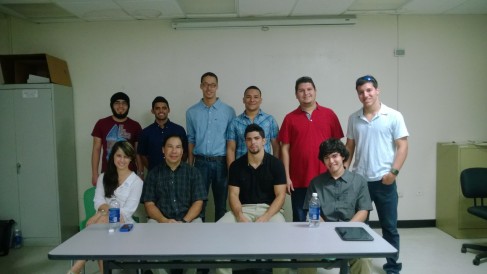A press conference about the brain drain in Puerto Rico-took place October 31, 2013 at the University of Puerto Rico- Mayagüez. The event was organized by UPRM students who moderated a panel composed of José Torres, a third year student majoring in mathematics, and Irwin Maldonado, a historian and teacher who graduated from UPRM in 1984. Both panelists have experienced the brain drain in some way that has affected their life.
Puerto Rico faces a major economic crisis, the island in the next 10 years, Maldonado said “I don’t think it can get worse”.
Many job opportunities are available in the United States, many openings for fresh out of college graduates, sad Torres. This is one of the main reasons Torres plans to make his living at the United States.
Young graduates in Puerto Rico are targeted by many companies from the United States. The main reason being that Puerto Ricans are more affordable to employed, compared to the payment the young professionals are offered in the country they studied, said Torres. “Is logical that a person will choose a better paid employment,” Maldonado added.
When the panelist were asked what they thought about creating an incentive, would be a good idea to encourage graduate students from Puerto Rico’s universities to stay and contribute to the country’s economy. “Any incentive is good,” Maldonado said. “Maybe lowering taxes and rising the hourly payment to professionals, would be a better and more plausible way to do things,” he added.
Additionally an article published on the Huffintonpost website says that family and general practitioners in Puerto Rico earn about $72,000 a year, while in the U.S. they earn about $180,000, according to 2012 statistics from the U.S. Bureau of Labor.
Also the island is so dependent of the United States, that any positive change in the economy of the U.S.A. will help improve the economy of this country, Maldonado said with an optimistic out-look. If the migration of the youth out of Puerto Rico continues, the economy will keep degrading making it harder to find progress.
Torres shared that he plans to finish his bachelor degrees in Puerto Rico, so he can save money for his masters in the United States. Jose also said that other students that live in the United States do the same, and come to Puerto Rico from the mainland just to get a cheaper and somewhat similar education, so they can then move to the United States to get a job.
This decision is made easier by taking into consideration that Puerto Ricans are already American citizens and can move to the mainland freely without having to go, through any migration process.
Additionally depopulation in Puerto Rico has made it more difficult for the territory to reverse its economic decline and pay off debts of about $70 billion, which are far higher on a per capita basis than any mainland state government, said Michael Connor in a reuters.com article published on September 9, 2013,
Another factor that contributes to this migration according to Torres experience is that the well-paid jobs in Puerto Rico are mostly given to people that have studied in more prestigious university’s in the U.S.A. “It’s not the same graduating from Massachusetts Institute of Technology than from the UPRM”, said Torres. He still prefers better paid jobs that are offered at the land of opportunities (U.S.A.), compared to the ones that are offered in Puerto Rico.
